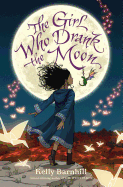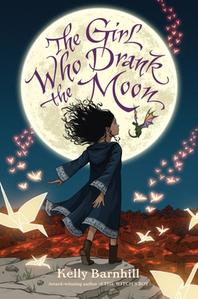
 The teen years are hard enough for mere mortals, but 13-year-old Luna holds a dangerous amount of magic she never even knew about... and it's starting to erupt. Luna was accidentally "enmagicked" by Xan, the goodhearted witch who rescued her when she was abandoned as a baby in the annual "Day of Sacrifice" of the Protectorate, or the City of Sorrows, a dismal, foggy place inhabited by "a subdued people, a compliant people, who lived their lives in a saddened haze."
The teen years are hard enough for mere mortals, but 13-year-old Luna holds a dangerous amount of magic she never even knew about... and it's starting to erupt. Luna was accidentally "enmagicked" by Xan, the goodhearted witch who rescued her when she was abandoned as a baby in the annual "Day of Sacrifice" of the Protectorate, or the City of Sorrows, a dismal, foggy place inhabited by "a subdued people, a compliant people, who lived their lives in a saddened haze."
The sad people have been tricked into believing they're appeasing a wicked witch by giving up a baby every year. But the witch, Xan, is actually an affectionate old woman who resembles "a large, good-tempered toad," and who believes the Protectorate is cruel to abandon their babies to the wild animals in the grumblingly volcanic forest. She's made it her duty to collect the cast-off babies and find them happy homes in the Free Cities. But this baby, with her black hair, black eyes and "calm, probing, unsettling gaze"--the baby she names Luna for the crescent moon birthmark on her forehead--is different. Distracted by the infant's charms, Xan mistakenly feeds her moonlight, instead of the usual dose of starlight, and a strong magic is kindled in the child. For the safety of "the girl who drank the moon," and perhaps the world, Xan decides to raise Luna herself in the forest home she shares with a bardic swamp monster, Glerk, and Fyrian, the endearingly cheerful, pocket-sized "Simply Enormous Dragon."
As Luna proves to be "a tangle of mischief and motion and curiosity" innocently wreaking havoc with her powers, Xan decides to cast a protective spell to suppress her magic until she turns 13. As they approach Luna's birthday, though, Xan has even more to worry about. A brave but misguided young man from the City of Sorrows, seeking to reform the sorrowful practice of baby sacrifice, is coming to kill the Witch, and Luna's mother, mad from grief and imprisoned in a tower, is plotting her way to the forest, too.
Kelly Barnhill (The Witch's Boy; Iron Hearted Violet) is a skilled storyteller, and she crafts wonderfully imperfect characters with poetic prose, warmth and wit. Rather than a strident good and evil face-off, Barnhill's complex story of relative truth allows each character to make his or her own choices, even very questionable ones. The resiliency of the heroes may be partly because of magic, but also because of critical thinking, empathy, deep love and the strength of family in all its unconventional manifestations.
The Girl Who Drank the Moon takes a probing look at social complexity and the high cost of secrets and lies, weaving multiple perspectives, past and present, into one cleverly unfolding fairy tale. The knots of miscommunication, habit and assumption that tangle Barnhill's characters may inspire readers to question the stories we're told. It takes brave and creative young people with their power to transform reality to clear the air and spread some light. Thoughtful and utterly spellbinding. --Kristianne Huntsberger, writer, storyteller and publishing assistant at Shelf Awareness
Shelf Talker: In Kelly Barnhill's fairy tale full of marvelous surprises, Luna comes of age, and all the assumptions of how things have always been are turned on their head.

